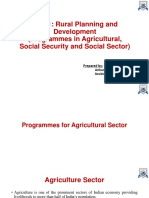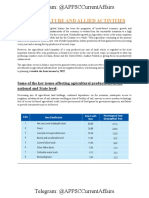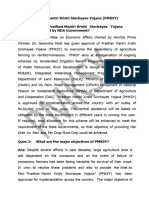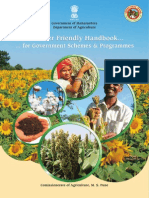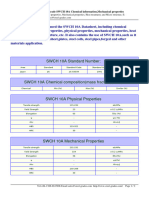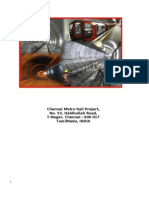0 ratings0% found this document useful (0 votes)
34 viewsTopic:-Government Schemes For The Economic Welfare of Farming Community
Topic:-Government Schemes For The Economic Welfare of Farming Community
Uploaded by
Alok shahThis document discusses and summarizes several key government schemes for the economic welfare of Indian farmers, including the National Mission for Sustainable Agriculture, Pradhan Mantri Krishi Sinchai Yojana, Paramparagat Krishi Vikas Yojana, Pradhan Mantri Fasal Bima Yojana, Gramin Bhandaran Yojna, livestock insurance schemes, fisheries training schemes, and the Micro Irrigation Fund. The schemes focus on areas like irrigation, organic farming, crop insurance, storage facilities, livestock insurance, fisheries development, and expanding microirrigation.
Copyright:
© All Rights Reserved
Available Formats
Download as DOCX, PDF, TXT or read online from Scribd
Topic:-Government Schemes For The Economic Welfare of Farming Community
Topic:-Government Schemes For The Economic Welfare of Farming Community
Uploaded by
Alok shah0 ratings0% found this document useful (0 votes)
34 views6 pagesThis document discusses and summarizes several key government schemes for the economic welfare of Indian farmers, including the National Mission for Sustainable Agriculture, Pradhan Mantri Krishi Sinchai Yojana, Paramparagat Krishi Vikas Yojana, Pradhan Mantri Fasal Bima Yojana, Gramin Bhandaran Yojna, livestock insurance schemes, fisheries training schemes, and the Micro Irrigation Fund. The schemes focus on areas like irrigation, organic farming, crop insurance, storage facilities, livestock insurance, fisheries development, and expanding microirrigation.
Original Title
RAWE -411C
Copyright
© © All Rights Reserved
Available Formats
DOCX, PDF, TXT or read online from Scribd
Share this document
Did you find this document useful?
Is this content inappropriate?
This document discusses and summarizes several key government schemes for the economic welfare of Indian farmers, including the National Mission for Sustainable Agriculture, Pradhan Mantri Krishi Sinchai Yojana, Paramparagat Krishi Vikas Yojana, Pradhan Mantri Fasal Bima Yojana, Gramin Bhandaran Yojna, livestock insurance schemes, fisheries training schemes, and the Micro Irrigation Fund. The schemes focus on areas like irrigation, organic farming, crop insurance, storage facilities, livestock insurance, fisheries development, and expanding microirrigation.
Copyright:
© All Rights Reserved
Available Formats
Download as DOCX, PDF, TXT or read online from Scribd
Download as docx, pdf, or txt
0 ratings0% found this document useful (0 votes)
34 views6 pagesTopic:-Government Schemes For The Economic Welfare of Farming Community
Topic:-Government Schemes For The Economic Welfare of Farming Community
Uploaded by
Alok shahThis document discusses and summarizes several key government schemes for the economic welfare of Indian farmers, including the National Mission for Sustainable Agriculture, Pradhan Mantri Krishi Sinchai Yojana, Paramparagat Krishi Vikas Yojana, Pradhan Mantri Fasal Bima Yojana, Gramin Bhandaran Yojna, livestock insurance schemes, fisheries training schemes, and the Micro Irrigation Fund. The schemes focus on areas like irrigation, organic farming, crop insurance, storage facilities, livestock insurance, fisheries development, and expanding microirrigation.
Copyright:
© All Rights Reserved
Available Formats
Download as DOCX, PDF, TXT or read online from Scribd
Download as docx, pdf, or txt
You are on page 1of 6
Topic :- Government schemes for the economic
welfare of farming community.
Submitted To :- Dr. D. B. Tyagi
Assistant Professor
School of Agriculture
ITM University
Submitted By :- Shivam Singh
Roll No. :- BAGN1AG17170
SEMESTER :- 7
National Mission For Sustainable Agriculture (NMSA)
National Mission for Sustainable Agriculture (NMSA) has been
formulated for enhancing agricultural productivity especially in
rainfed areas focusing on integrated farming, water use efficiency,
soil health management and synergizing resource conservation.
NMSA will cater to key dimensions of 'Water use efficiency', 'Nutrient
Management' and 'Livelihood diversification' through adoption of
sustainable development pathway by progressively shifting to
environmental friendly technologies, adoption of energy efficient
equipments, conservation of natural resources, integrated farming,
etc.
Schemes under NMSA
1. Rainfed Area Development (RAD): RAD is being implemented by
RFS Division
2. Soil Health Management (SHM): SHM is being implemented by
INM Division
3. Sub Mission on Agro Forestry (SMAF): SMAF is being implemented
by NRM Division
4. Paramparagat Krishi Vikas Yojana (PKVY): PKVY is being
implemented by INM Division
5. Soil and Land Use Survey of India (SLUSI): Being implemented by
RFS Division
6. National Rainfed Area Authority (NRAA): Being implemented by
RFS Division
7. Mission Organic Value Chain Development in North Eastern
Region (MOVCDNER): Being implemented by INM Division
8. National Centre of Organic Farming (NCOF): Being implemented
by INM Division
9. Central Fertilizer Quality Control and Training Institute (CFQC&TI):
implemented by INM Division
Pradhan Mantri Krishi Sinchai Yojana (PMKSY)
Har Khet ko Pani "Prime Minister Krishi Sinchayee Yojana"
Government of India is committed to accord high priority to water
conservation and its management. To this effect Pradhan Mantri
Krishi Sinchayee Yojana (PMKSY) has been formulated with the vision
of extending the coverage of irrigation 'Har Khet ko pani' and
improving water use efficiency 'More crop per drop' in a focused
manner with end to end solution on source creation, distribution,
management, field application and extension activities.
Paramparagat Krishi Vikas Yojana (PKVY)
The Paramparagat Krishi Vikas Yojana (PKVY), an initiative to
promote organic farming in the country, was launched by the NDA
government in 2015.
According to the scheme, farmers will be encouraged to form groups
or clusters and take to organic farming methods over large areas in
the country.
The aim is to form 10,000 clusters over the next three years and
bring about five lakh acres of agricultural area under organic farming.
The government also intends to cover the certification costs and
promote organic farming through the use of traditional resources.
To avail the scheme, each cluster or group must have 50 farmers
willing to take up organic farming under the PKVY and possess a total
area of at least 50 acres. Each farmer enrolling in the scheme will be
provided INR 20,000 per acre by the government spread over three
years time.
Pradhan Mantri Fasal Bima Yojana (PMFBY)
Pradhan Mantri Fasal Bima Yojana (PMFBY) is the government
sponsored crop insurance scheme that integrates multiple
stakeholders on a single platform.
Objectives
1. To provide insurance coverage and financial support to the
farmers in the event of failure of any of the notified crop as a result
of natural calamities, pests & diseases.
2. To stabilise the income of farmers to ensure their continuance in
farming.
3. To encourage farmers to adopt innovative and modern agricultural
practices.
4. To ensure flow of credit to the agriculture sector.
Gramin Bhandaran Yojna
Objective of this Scheme:
10. Create scientific storage capacity with allied facilities in rural
areas.
11. To meet the requirements of farmers for storing farm produce,
processed farm produce and agricultural inputs.
12. Promotion of grading, standardization and quality control of
agricultural produce to improve their marketability.
13. Prevent distress sale immediately after harvest by providing the
facility of pledge financing and marketing credit by strengthening
agricultural marketing infrastructure in the country.
Livestock insurance Scheme
This scheme aims to provide protection mechanism to the farmers
and cattle rearers against any eventual loss of their animals due to
death and to demonstrate the benefit of the insurance of livestock to
the people and popularize it with the ultimate goal of attaining
qualitative improvement in livestock and their products.
Scheme on Fisheries Training and Extension
It was launched to provide training for fishery sector so as to assist in
undertaking fisheries extension programmes effectively.
National Scheme on Welfare of Fishermen
This scheme was launched to provide financial assistance to fishers
for construction of house, community hall for recreation and
common working place. It also aims to install tube-wells for drinking
water and assistance during lean period through saving cum relief
component.
Micro Irrigation Fund (MIF)
The government approved a dedicated Rs5,000 crore fund to bring
more land area under microirrigation as part of its objective to boost
agriculture production and farmers income.
The fund has been set up under NABARD, which will provide this
amount to states on concessional rate of interest to promote micro-
irrigation, which currently has a coverage of only 10 million hectares
as against the potential of 70 million hectares.
You might also like
- SK820Document252 pagesSK820ปูหลน ไซไซNo ratings yet
- Debate WorksheetsDocument3 pagesDebate Worksheetsapi-367974926100% (2)
- THE DOUBLE AS THE "UNSEEN" OF CULTURE: TOWARD A DEFINITION OF DOPPELGANGER de Milica ŽivkovićDocument8 pagesTHE DOUBLE AS THE "UNSEEN" OF CULTURE: TOWARD A DEFINITION OF DOPPELGANGER de Milica ŽivkovićMaxwell Demon100% (3)
- Balance Your ChakrasDocument2 pagesBalance Your Chakrasarunsrl100% (1)
- 01 - 003 - Important Government Schemes in Agriculture SectorDocument3 pages01 - 003 - Important Government Schemes in Agriculture SectorRe IverNo ratings yet
- D - R M L N L U, L: National Policy For Farmers 2007 and Need For ReformsDocument13 pagesD - R M L N L U, L: National Policy For Farmers 2007 and Need For Reformshardik anandNo ratings yet
- Schemes For FarmersDocument5 pagesSchemes For FarmerssunnytataNo ratings yet
- Government Schemes E15Document200 pagesGovernment Schemes E15ggihklghNo ratings yet
- UNIT 1 Programmes in Rural Development (1) PART ADocument39 pagesUNIT 1 Programmes in Rural Development (1) PART Asanyagupta924No ratings yet
- Government ProgrammesDocument37 pagesGovernment ProgrammesKshitij SinghNo ratings yet
- Law and Agriculture ProjectDocument10 pagesLaw and Agriculture ProjectUtkarsh KumarNo ratings yet
- Telangana Govt SchemesDocument6 pagesTelangana Govt SchemesraviNo ratings yet
- Schemes OdishaDocument296 pagesSchemes Odishamahima patraNo ratings yet
- English Medium Government Scheme by Kumar Amit SirDocument51 pagesEnglish Medium Government Scheme by Kumar Amit Sirsomil049rajNo ratings yet
- Schemes for Agriculture and Farmers WelfareDocument2 pagesSchemes for Agriculture and Farmers Welfarekaushalsingh5954No ratings yet
- Agriculture: Pradhan Mantri Krishi Sinchai YojanaDocument3 pagesAgriculture: Pradhan Mantri Krishi Sinchai YojanakrithikNo ratings yet
- Eco SleDocument9 pagesEco SleManit PanchalNo ratings yet
- Agri Pro Insights & Quiz Kit Ibps So Afo - 241005 - 223801Document37 pagesAgri Pro Insights & Quiz Kit Ibps So Afo - 241005 - 223801trillionairelifestyle09No ratings yet
- Agriculture: Dependent On RainfallDocument7 pagesAgriculture: Dependent On Rainfallmanupaul123100% (1)
- Schemes For Goat FarmingDocument19 pagesSchemes For Goat FarmingJYOTI SUNDAR ROUTNo ratings yet
- National Consultation On SDG-2 - Concept NoteDocument3 pagesNational Consultation On SDG-2 - Concept NoteSAMYUKKTHHA S (RA2252001040009)No ratings yet
- All Govt Schemes 2023 VishnuiasDocument161 pagesAll Govt Schemes 2023 VishnuiasbooksreadbyharshNo ratings yet
- MOFS ReportDocument6 pagesMOFS Reportbtobfun07No ratings yet
- 6 Organic FarmingDocument6 pages6 Organic FarmingSaranyaNo ratings yet
- Reforms by Ministry of Agriculture & Farmers Welfare and Its Possible ImpactDocument2 pagesReforms by Ministry of Agriculture & Farmers Welfare and Its Possible ImpactVivek VenugopalNo ratings yet
- About The Sub-Mission On Agroforestry (SMAF)Document6 pagesAbout The Sub-Mission On Agroforestry (SMAF)VIKASH ARYANNo ratings yet
- Agriculture and Farmers - FInalDocument7 pagesAgriculture and Farmers - FInalQuân Nguyễn MinhNo ratings yet
- Green Revolution Krishonnati YojanaDocument4 pagesGreen Revolution Krishonnati Yojanadhan mNo ratings yet
- Agriculture and Allied ActivitiesDocument22 pagesAgriculture and Allied ActivitiesNisarNo ratings yet
- Schemes in Budget by Team MaggubhaiDocument14 pagesSchemes in Budget by Team MaggubhaiMohit SidhwaniNo ratings yet
- What Is Rural Development?: Unit 1Document8 pagesWhat Is Rural Development?: Unit 1Kashif BaigNo ratings yet
- Indian AgricultureDocument6 pagesIndian AgricultureKashish rajNo ratings yet
- Loksabhaquestions Annex 182 AS220 iNFz3IDocument9 pagesLoksabhaquestions Annex 182 AS220 iNFz3IAshish Ranjan SinghNo ratings yet
- Executive Summary: Chapter 1 - From Crisis To ConfidenceDocument48 pagesExecutive Summary: Chapter 1 - From Crisis To Confidencedivyanshu kumarNo ratings yet
- SDPDocument6 pagesSDPRahulNo ratings yet
- Swaminathan Committee Report: An Overview: June 2020Document9 pagesSwaminathan Committee Report: An Overview: June 2020dearsirbharteyNo ratings yet
- Green Revolution - Meaning, Schemes & Impact of Green Revolution in IndiaDocument1 pageGreen Revolution - Meaning, Schemes & Impact of Green Revolution in IndiaTaran SainiNo ratings yet
- FAQDocument6 pagesFAQdeepmalagupta507No ratings yet
- Soil Health Card Scheme 2Document2 pagesSoil Health Card Scheme 2chirag.jain8982No ratings yet
- 47061382760c2a8 Technology MissionsDocument10 pages47061382760c2a8 Technology MissionsbuchakshaNo ratings yet
- Ard H.W. D.W.1Document7 pagesArd H.W. D.W.19gn94gy2dgNo ratings yet
- Unit 1Document35 pagesUnit 1singham885813No ratings yet
- NPM Brief Note July 2009Document5 pagesNPM Brief Note July 2009William VaughnNo ratings yet
- AgricultureDocument9 pagesAgricultureSoumyashree PanigrahiNo ratings yet
- MOFS ReportDocument4 pagesMOFS Reportbtobfun07No ratings yet
- Krishi HandbookA4 Eng PDFDocument0 pagesKrishi HandbookA4 Eng PDFREDDYGAARI ABBAYINo ratings yet
- Union Budget 2023-24Document3 pagesUnion Budget 2023-24garimachoudhary2001No ratings yet
- Dr. Virendra SinghDocument5 pagesDr. Virendra SinghHanumanNo ratings yet
- Pradhan Mantri Fasal Bima YojanaDocument4 pagesPradhan Mantri Fasal Bima YojanaGaurav JainNo ratings yet
- Green Revolution in IndiaDocument4 pagesGreen Revolution in IndiasssNo ratings yet
- Administrative LawDocument9 pagesAdministrative Lawbgunjan2004No ratings yet
- SchemesDocument32 pagesSchemesjashuramuNo ratings yet
- NFSMDocument30 pagesNFSMArjun PatilNo ratings yet
- UNIT VI V0001005-1Document20 pagesUNIT VI V0001005-1hs4530192No ratings yet
- AgricultureDocument15 pagesAgriculturemaheshwariNo ratings yet
- Brah'25 - Mains - Part-2 ECONOMYDocument28 pagesBrah'25 - Mains - Part-2 ECONOMYgattayadavjmd123No ratings yet
- Transforming Agriculture Government's Holistic Strategy For ProductivityDocument3 pagesTransforming Agriculture Government's Holistic Strategy For ProductivityKaushik PatelNo ratings yet
- UntitledDocument12 pagesUntitledVijaychandra ReddyNo ratings yet
- RPSC AenDocument58 pagesRPSC AenVikas VermaNo ratings yet
- Impact of New Economic Policy On AgricultureDocument5 pagesImpact of New Economic Policy On AgricultureVishesh GuptaNo ratings yet
- Technological Trends in Water Sector for a Sustainable SolutionFrom EverandTechnological Trends in Water Sector for a Sustainable SolutionNo ratings yet
- Doing Aquaculture as a Business for Small- and Medium-Scale Farmers. Practical Training Manual. Module 2: The Economic Dimension of Commercial AquacultureFrom EverandDoing Aquaculture as a Business for Small- and Medium-Scale Farmers. Practical Training Manual. Module 2: The Economic Dimension of Commercial AquacultureNo ratings yet
- Rahul Gandhi Vs Purnesh ModiDocument27 pagesRahul Gandhi Vs Purnesh ModiAlok shahNo ratings yet
- Terminator XI Vs Monks XI Dream SheetDocument2 pagesTerminator XI Vs Monks XI Dream SheetAlok shahNo ratings yet
- Stumps Match Report-3Document3 pagesStumps Match Report-3Alok shahNo ratings yet
- Limit of Transfer of MaliceDocument30 pagesLimit of Transfer of MaliceAlok shahNo ratings yet
- DocumentDocument1 pageDocumentAlok shahNo ratings yet
- Outstation BrochureDocument12 pagesOutstation BrochureAlok shahNo ratings yet
- Family Law I Teaching PLAN 2022Document20 pagesFamily Law I Teaching PLAN 2022Alok shahNo ratings yet
- Resolution of The Mess CommitteeDocument3 pagesResolution of The Mess CommitteeAlok shahNo ratings yet
- Academic Calendar - Mar - July 2022Document1 pageAcademic Calendar - Mar - July 2022Alok shahNo ratings yet
- Runners Docx-1Document1 pageRunners Docx-1Alok shahNo ratings yet
- Applicant Name Application No. Course Receipt No Date Payment Mode Instrument No Bank SL No Description AmountDocument1 pageApplicant Name Application No. Course Receipt No Date Payment Mode Instrument No Bank SL No Description AmountAlok shahNo ratings yet
- DNLU Projet Legal MethodsDocument14 pagesDNLU Projet Legal MethodsAlok shahNo ratings yet
- 1.1 History As A DisciplineDocument7 pages1.1 History As A DisciplineAlok shah100% (1)
- 1.4 Sources of Hindu LawDocument3 pages1.4 Sources of Hindu LawAlok shahNo ratings yet
- Module-I SanskritizationDocument10 pagesModule-I SanskritizationAlok shah100% (1)
- India Justice Report 2020Document118 pagesIndia Justice Report 2020Alok shahNo ratings yet
- ThemeDocument1 pageThemeAlok shahNo ratings yet
- Transitive and Intertransitive VerbsDocument4 pagesTransitive and Intertransitive VerbsAlok shahNo ratings yet
- A Critical Analysis of Cyber Bullying in India-With Special Reference To Bullying in CollegeDocument12 pagesA Critical Analysis of Cyber Bullying in India-With Special Reference To Bullying in CollegeAlok shahNo ratings yet
- PDF Rural EconomicsDocument6 pagesPDF Rural EconomicsAlok shahNo ratings yet
- Dnlu Project PsDocument15 pagesDnlu Project PsAlok shahNo ratings yet
- MR 180 EditedDocument6 pagesMR 180 EditedfatmadianaNo ratings yet
- wst01 01 Rms 20230112Document15 pageswst01 01 Rms 20230112PilotNo ratings yet
- Nursing Priority Interventions For Cystic Fibrosis1Document7 pagesNursing Priority Interventions For Cystic Fibrosis1api-314849412No ratings yet
- Pratt Van Wigerden (2009) Nurs Care of Pt.s With TB (Schaaf Zumla - Tuberculosis (Chapter 69) XDocument7 pagesPratt Van Wigerden (2009) Nurs Care of Pt.s With TB (Schaaf Zumla - Tuberculosis (Chapter 69) XJelly JiaNo ratings yet
- Automatically Generated VLSI Memory (December 2003) : Allen TANNER, Jerry TAN, and Scott HOLMESDocument10 pagesAutomatically Generated VLSI Memory (December 2003) : Allen TANNER, Jerry TAN, and Scott HOLMESPraveen NagaretnamNo ratings yet
- WWW Asc Alchemy Com Asc HTMLDocument4 pagesWWW Asc Alchemy Com Asc HTMLJimm NewtronNo ratings yet
- Phenol: A Guide For CAPE StudentsDocument11 pagesPhenol: A Guide For CAPE StudentsJordan SteeleNo ratings yet
- Color-Control of Long-Lasting Phosphorescence (LLP) Through Rare Earth Ion-Doped Cadmium Metasilicate PhosphorsDocument7 pagesColor-Control of Long-Lasting Phosphorescence (LLP) Through Rare Earth Ion-Doped Cadmium Metasilicate PhosphorsIlse Guadalupe EncinasNo ratings yet
- Mobil USM Case-1Document21 pagesMobil USM Case-1HolynesNo ratings yet
- Performance Task 2Document8 pagesPerformance Task 2eidrenison2002No ratings yet
- Social and Preventive Pharmacy: Assignment TopicsDocument10 pagesSocial and Preventive Pharmacy: Assignment TopicsRakshita GroverNo ratings yet
- 27-Unnatural Death - Patricia CornwellDocument315 pages27-Unnatural Death - Patricia CornwellMarlie ProdehlNo ratings yet
- Linear Seating Arrangement Questions For IBPS PO PDFDocument9 pagesLinear Seating Arrangement Questions For IBPS PO PDFPRABHAT JHANo ratings yet
- Stadium District Urban Design, Land Use and Feasibility StudyDocument30 pagesStadium District Urban Design, Land Use and Feasibility StudyHtoo Myat AungNo ratings yet
- Supratec MBR-600Document4 pagesSupratec MBR-600unconformistNo ratings yet
- Injection Molding NotesDocument23 pagesInjection Molding NotesK_Amey50% (2)
- CPM112.1 Microbiological Control of Sterile WaterDocument3 pagesCPM112.1 Microbiological Control of Sterile WaterNguyen QuangNo ratings yet
- Operation and Maintenance Manual: 250-B17F 250-B17F/1 250-B17F/2 1 May 2004 Revision 10 First Edition 1 November 1989Document17 pagesOperation and Maintenance Manual: 250-B17F 250-B17F/1 250-B17F/2 1 May 2004 Revision 10 First Edition 1 November 1989Anonymous 298xlo3uUNo ratings yet
- Thomas HobbesDocument23 pagesThomas HobbesImti LemturNo ratings yet
- Cma Ubdhh 6518 E2-10 Pa5Document1 pageCma Ubdhh 6518 E2-10 Pa5michele DSNo ratings yet
- Greedy AlgorithmsDocument110 pagesGreedy AlgorithmsMITALBAHEN DHOLAKIYANo ratings yet
- Environmental Economics An Introduction 7th Edition Field Test BankDocument8 pagesEnvironmental Economics An Introduction 7th Edition Field Test Bankherbistazarole5fuyh6100% (31)
- Types of Wounds 101Document17 pagesTypes of Wounds 101Grey Tapes100% (1)
- 1.6. Antenna Efficiency: e e e eDocument18 pages1.6. Antenna Efficiency: e e e ejon ionNo ratings yet
- SWCH 10aDocument2 pagesSWCH 10asujiyopptsrNo ratings yet
- SOP For Working at HeightDocument19 pagesSOP For Working at HeightShreedhar95% (19)









